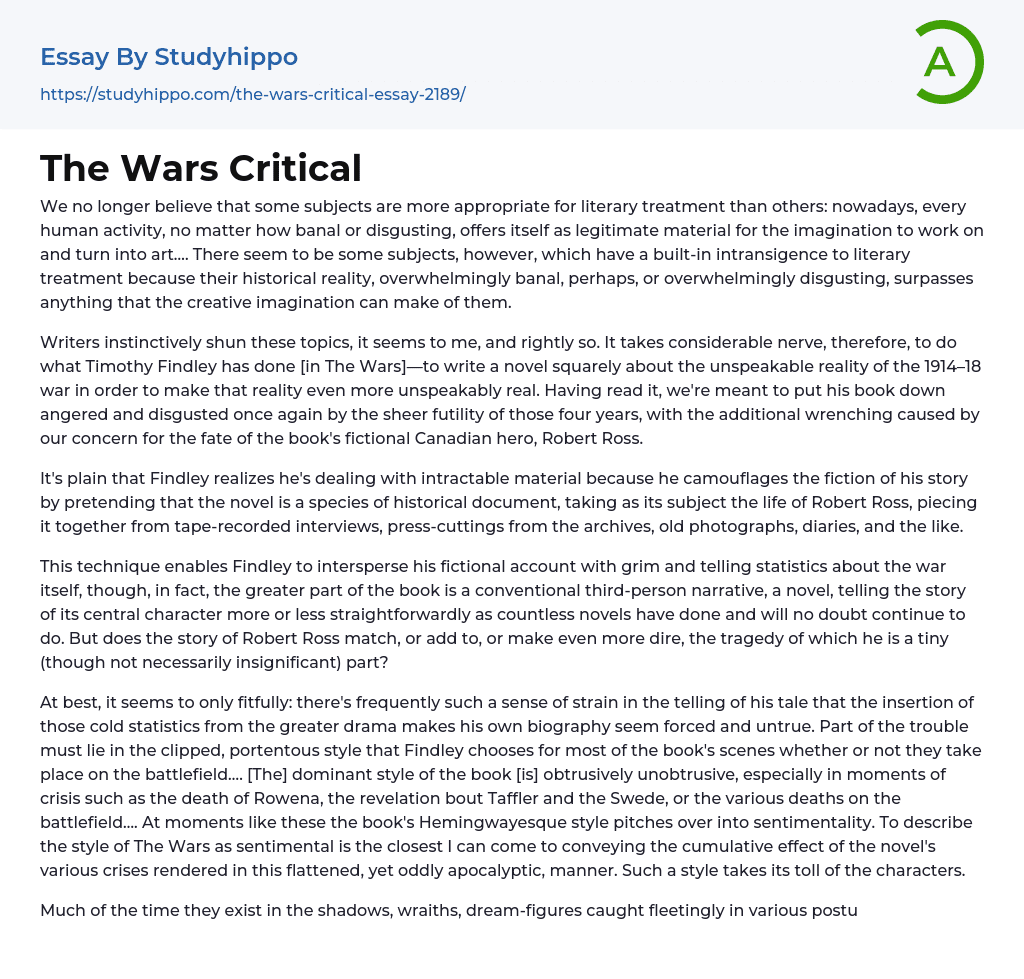Nowadays, all human activities, regardless of their banality or disgust, are seen as worthy material for artistic expression. However, certain subjects possess an inherent resistance to being portrayed in literature. Their historical reality, which may be overwhelmingly banal or disgusting, surpasses the boundaries of creative imagination.
It seems to me that writers naturally avoid these topics, and rightfully so. Therefore, it takes a lot of courage for Timothy Findley to write a novel like The Wars, which directly addresses the unspeakable reality of the First World War, in order to make that reality even more unspeakably real. The intention behind reading his book is to leave us feeling angry and disgusted, once again, by the pointless nature of those four years. This is further intensified by our worries for the fictional Canadian protagonist, Robert Ross.
Findley acknowledges the challenging
...nature of the material he is working with by disguising the fictional elements of his story. He presents the novel as a type of historical document, focusing on the life of Robert Ross and utilizing various sources such as recorded interviews, archived press cuttings, photographs, diaries, and similar materials to construct the narrative.
This technique allows Findley to incorporate stark and revealing statistics about the war while intertwining them with his fictional narrative. The majority of the book, however, follows a traditional third-person storytelling approach, presenting the story of its main character in a straightforward manner, much like numerous novels before and after. But does Robert Ross' story complement, enhance, or intensify the already tragic events in which he plays a small (yet potentially meaningful) role?
The telling of his tale sometimes fits only sporadically, as there is often
a sense of strain. The inclusion of cold statistics from the overarching drama makes his own biography seem forced and false. A big part of the problem lies in the clipped, ominous style chosen by Findley for most scenes in the book, regardless of whether they occur on the battlefield... This dominant style is painfully unnoticeable, particularly during critical moments like Rowena's death, the revelation about Taffler and the Swede, or the various deaths on the battlefield... In these instances, the book's Hemingway-like style becomes sentimentality. To label The Wars as sentimental is the closest I can come to expressing the cumulative impact of the novel's numerous crises depicted in this flattened, yet strangely apocalyptic, manner. Such a style adversely affects the characters.
The characters in the novel often exist in the shadows, appearing as ghostly figures in various postures. Their behavior is difficult to comprehend except for its reflection of the challenges of their time. They can be described as distant eccentrics, including Robert's mother and Lady Barbara d'Orsey, whom Robert develops feelings for. Robert himself is a silent hero who is predominantly influenced by others rather than being proactive. He may be the primary victim of the novel's style. Ultimately, the novel requires our distressed sympathy, even though it has not sufficiently earned it. (pp. 173-74)
- Book Summary essays
- Metaphor essays
- Reader essays
- Rhyme essays
- Literary devices essays
- Villain essays
- Books essays
- Genre essays
- Literary Criticism essays
- Writer essays
- Protagonist essays
- Simile essays
- Poem essays
- Book Report essays
- Book Review essays
- Greek Mythology essays
- Plot essays
- Tragic Hero essays
- Coming of Age essays
- Play essays
- Rhetoric essays
- Rhetorical Question essays
- Translation essays
- Understanding essays
- Reason essays
- Character essays
- Letter essays
- American Literature essays
- Literature Review essays
- Utopia essays
- Poetry Analysis essays
- Dante's Inferno essays
- Between The World and Me essays
- Incidents in The Life of a Slave Girl essays
- Flowers for Algernon essays
- Myth essays
- Everyday Use essays
- Boo Radley essays
- Genesis essays
- Richard iii essays
- Alice in Wonderland essays
- On the road essays
- Ozymandias essays
- The Nightingale essays
- Holden Caulfield essays
- Animal Farm essays
- 1984 essays
- A Hanging essays
- Shooting An Elephant essays
- A Tale Of Two Cities essays




